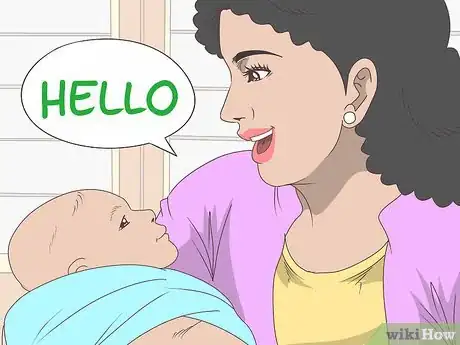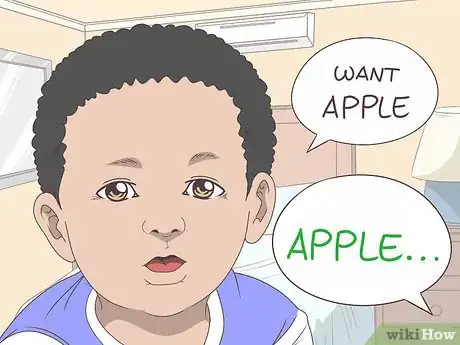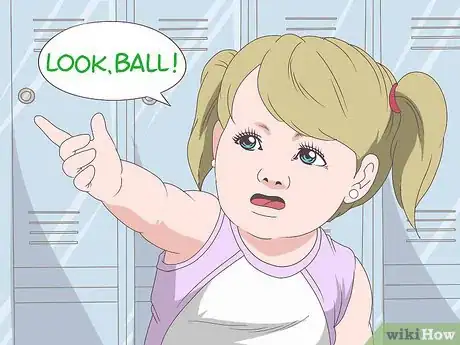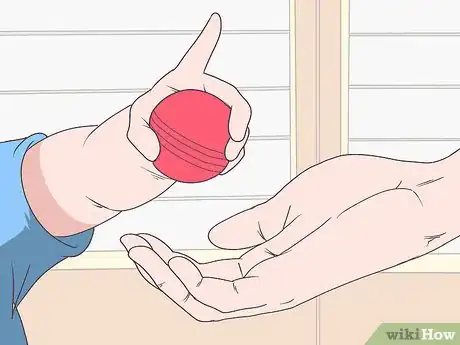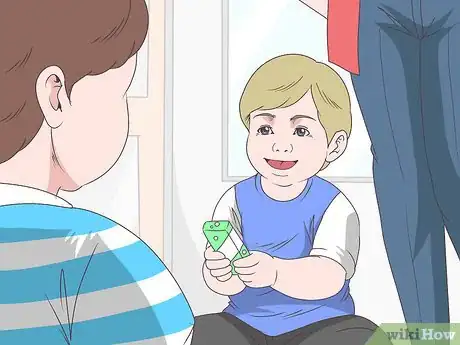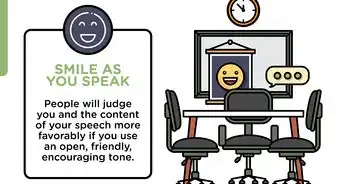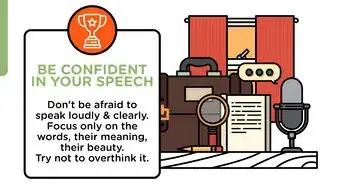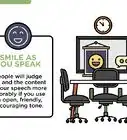This article was co-authored by Kylee Money and by wikiHow staff writer, Megaera Lorenz, PhD. Kylee Money is a Parenting Consultant and the Founder and CEO of Parenting Made Joyful. Since 2001, Kylee has worked with over 1,000 parents and families on sleep training, behavior management, potty training, and more. She is a contributing writer and board advisory member at Pampers.com, a CBS News Parent Expert, and featured on Fox and Friends and Buy Buy Baby. Kylee also speaks nationally at parenting expos on the subject of sleep training.
There are 10 references cited in this article, which can be found at the bottom of the page.
This article has been viewed 15,695 times.
Watching a child learn to speak is an exciting and wondrous experience, but it can also be nerve-wracking—especially if you’re not sure whether your child’s language skills are developing as they should. While babies and children do most of the work of learning to speak on their own, there are things you can do to help the process along. For instance, the simple acts of singing and talking to your baby every day can help them begin to build early speech skills. If you have any concerns about how your child’s speech is developing, make an appointment with their pediatrician for an assessment.
Steps
Encouraging a Baby to Talk
-
1Sing to your baby every day. Singing is one of the first ways that parents begin to bond and communicate with their children. Sing to your baby regularly to teach them some of the basic building-blocks of language, such as vocabulary, cadence, and rhythm. They also find singing soothing, so you are teaching them to associate language and vocalization with love and comfort.[1]
- You can also turn singing into a game to keep your baby engaged and help them learn new vocabulary. For example, if you’re singing a song about a duck, hold up a toy duck and dance it around while you sing.
- Singing is beneficial to your child at every age. In fact, you can start singing to your baby while they are still in the womb!
-
2Talk to your baby frequently. Even if your baby is too young to understand or respond, talking to them will start to get them familiar with—and interested in—speech. Talk to your baby in a happy, gentle voice as you play with them and care for them. If there are other people around, converse with them in front of your baby.[2] [3]
- You can also talk about what you’re doing as you go about your daily routine in front of the baby. For example, “Now I’m making my breakfast! Let’s see, what do I want to eat today? How about some yummy oatmeal?”
- Smile and make eye contact when you talk to the baby to keep them engaged.
- Start talking to your baby as soon as they’re born. They’ll even hear you if you speak to them in the womb.
Advertisement -
3Read to your baby. Reading is another great way to bond with your baby and encourage early language learning skills.[4] Start with board books or fabric books with 1 or 2 simple images on each page. Point at the pictures and describe what you see. Your baby may want to engage with their other senses, too (for example, they might touch or chew on the book).
- Look for “touch and feel” books that encourage your baby to use all their senses, like the classic board book Pat the Bunny by Dorothy Kunhardt. Talk to your baby not only about what they can see on the page, but what they can feel or hear when they interact with the book.
- For example, “Do you see the bunny? Feel how soft it is!”
Tip: Even newborns can benefit from reading with their parents or other caretakers. They may not be able to understand what you’re saying, but they’ll enjoy listening to your voice and spending time with you while you read.
-
4Describe objects that the baby interacts with. Talk about things that are familiar to your baby, such as their favorite toys, eating utensils, or articles of clothing.[5] If you talk about these things every time you use them, your baby will soon begin to associate specific words with those objects.
- For example, you might say, “Here comes your spoon, with some delicious food on it!” or “Do you want your blanket? Here’s your nice, warm blanket.”
- You can also describe actions that your baby uses regularly. For example, hold your baby’s hand and help them stroke your cat’s fur while saying, “Pet the cat!”
- You can start doing this from the moment your baby is born. You may not hear them repeat any of the words you use until they’re around a year old, but they’ll likely start learning what the words mean much earlier than that.[6]
-
5Imitate your baby’s sounds. By the time your baby is a few months old, they will begin to experiment with making “speech” sounds of their own. If you hear your baby gurgling or cooing, mimic their sounds.[7] This will encourage them to keep making sounds and help them understand the back-and-forth elements of conversation.
- Try reacting to your baby’s noises as though they are actually saying something to you. For example, “‘Ba ba ba,’ you say? Is that so? Well, I agree!”
- You may start to hear your baby cooing and making deliberate sounds (other than crying) by the time they’re 2-3 months old. Most babies begin babbling by the time they’re 6 months old.[8]
-
6Repeat your own words if the baby tries to imitate them. As your baby is beginning to learn to make sounds of their own, you may hear them trying to imitate things that you say. If you hear your baby mimicking you, act pleased and excited and repeat the sound or word to encourage them to try again.[9]
- For example, if you say, “Look at the cat,” your baby may respond with “Tat.” Say, “Cat! Cat! That’s right!”
- Some babies might start to imitate sounds you make as early as 3-6 months of age, although others won’t begin to do this until they’re closer to a year old.
-
7Act excited and happy if the baby says a word. Hearing your baby say a new word is thrilling. When it happens, don’t hold back! Let your baby see how pleased you are. Grin, clap your hands, and say, “You said ‘Mama!’ Wow! Good job!” This will get them excited about talking and encourage them to do it some more.[10]
- Keep encouraging your baby to use their new vocabulary. Ask them to say the word, and always respond when they use it on their own.
- For example, if your baby says “baba” for bottle, respond with, “Oh, you want your bottle?” and hold up the bottle.
- Most babies first start saying words when they’re around a year old, but some might begin doing so a little earlier or a little later.
-
8Incorporate quiet time into the baby’s routine. During moments of quiet, your baby will play and explore their ability to make sounds on their own.[11] Make sure there are times when your baby can babble and play with toys without any distraction from the TV, radio, or other sources of noise.
- You don’t have to be totally silent during your baby’s quiet time—you can still sing, talk, and respond to your baby’s noises. Just keep outside noises to a minimum.
- Quiet time is important for your baby or child at every age.
-
9Be patient with your baby as they learn. While most babies begin to talk when they’re around a year old, some may do it earlier or later. All children develop differently, so don’t panic if your baby isn’t learning to speak as quickly as you expected.[12]
- If you do have concerns about your baby’s language skills or overall development, talk to your pediatrician.
- Learning to speak should be a positive experience for your baby. Don’t act frustrated with them if they aren’t able to produce or respond to words and sounds the way you want them to.
Developing More Advanced Language Skills
-
1Play singing or talking games with your child. Games are a great way to help your child explore different aspects of language. When you sing or talk with your child, encourage them to interact and respond in fun ways.[13]
- When you’re singing a familiar song with your child, you might leave out a word and let your child fill it in. For example, you could sing, “Twinkle, twinkle, little—” and let your child respond with “Star!”
- Teach your child nursery rhymes or clapping games, like Patty-Cake.
- You can start playing games like these with your child when they’re still a baby, but they might not start participating until they’re a little older (e.g., around 18 months to 2 years).
Tip: Playing word games is a great way to both build your child’s vocabulary and help them develop other important thinking skills, like pattern recognition.
-
2Ask your child open-ended questions. As your child begins to get older and develop more complex language skills (like the ability to build simple phrases and sentences), you can encourage them to use their skills by asking questions. Try asking questions that require more than a simple “yes” or “no” answer.[14]
- For example, “Which shirt do you want to wear today?” or “Look at all the doggies in this picture. What are they doing?”
- Give your child a chance to answer the question. If they don’t respond, try making suggestions. For example, “I think those dogs are driving cars! Where do you think they’re going?”
- While you can start asking your child questions like these at any age, they might not start answering until they’re around 2 or 3 years old.
-
3Build on what your child is trying to say. You can encourage your child to start creating more complex phrases and sentences by expanding on their words and phrases.[15] You can either guess what your child is trying to say or elaborate by adding more descriptive language.
- For example, if your child says, “Want apple,” you can respond by saying something like, “Oh, you want to eat this juicy green apple, don’t you!”
- This is a great strategy to try when your child first starts using words or phrases, usually between the ages of 12 and 15 months. You can keep doing it as they get a little older, however.
-
4Let your child take the lead in conversations. If your child wants to talk about something, respond and stay on the same topic. If you talk about things your child is interested in, they’ll be encouraged to keep talking![16]
- For example, if your toddler runs up to you with a ball and says, “Look, ball!” Say, “Oh, wow, that is a nice ball! What color is your ball?”
- Start doing this as soon as your child begins to use words. Showing an interest in what they have to say will make the learning process more fun right from the start.
-
5Give the child simple requests or instructions. Asking your child to do things can encourage them to build stronger listening and comprehension skills as well as expanding their vocabulary. Start with simple requests with just one step.[17]
- For example, “Please give me your cup,” or “Can you show me your nose?”
- Model the kinds of language you want your child to use. For example, when you make a request, say “Please.” If your child responds and does what you ask, say, “Thank you!”
- Most children start to understand simple instructions by the time they’re around 12-17 months old.[18]
-
6Incorporate conversations into pretend play. Role-play and make believe are important parts of the learning process for kids. Play games with your child using toys or just pretending to be different characters. Come up with imaginative scenarios and act them out.[19]
- Narrate the action and do voices for the different characters as you play. For example, “Oh no, the monster captured the prince and took him to his cave! He’s saying, ‘Rargh, I’m going to eat you, prince.’ We’d better rescue him!”
- You can start encouraging pretend play as soon as your baby starts to speak or even earlier. They may not contribute much to the conversation until they’re a little older (around 2 years), though.
-
7Encourage the child to talk to others. To really build your child’s language skills, it’s important to get them talking to as many people as possible. Try to get conversations going between your child and other people in your life, such as family members, friends, and other kids.[20]
- You may be able to get conversations going by encouraging your child to talk about things they’re interested in. For example, “Why don’t you tell Uncle William about your dragon book?”
- This will become easier and more fun for your child as they get old enough to put together simple sentences. For most children, that starts to happen at around 2-3 years of age.
-
8Keep the learning experience positive and fun. Different children develop language skills at different ages. Be supportive and patient as your child learns to speak. They’ll be a lot more interested in talking if your conversations are joyful, loving, and low-pressure.[21]
- Don’t criticize or scold your child if they make a mistake while learning to talk. Instead, focus on modeling the kind of speech you want them to use.
- Avoid pressuring your child into speaking when they don’t want to.
Helping a Late Talker
-
1Discuss any concerns with your child's doctor. If your child isn’t meeting their speech milestones as you expect them to, make an appointment with their doctor. It’s possible that your child simply isn’t ready to start talking, but it’s always a good idea to get your concerns checked out and catch any potential development issues early.[22]
- Your child’s pediatrician will probably ask you about their speech during regular well-child checkups. They may recommend an evaluation if your child isn’t meeting certain milestones.
- For example, they may suspect a speech delay if your child doesn’t respond to their name by about 12 months or hasn’t started using any words by the time they’re 15 months old.
-
2Have your child’s hearing tested if you suspect a speech delay. One of the most common reasons for a speech delay in young children is difficulty hearing. Ask your pediatrician to perform a hearing test or refer you to someone who can. That way, you can begin treating any hearing issues as early as possible.[23]
- Possible treatments for childhood hearing loss include hearing aids, surgical treatments (such as cochlear implants), and supportive therapies such as listening therapy or lip reading.
Did you know? There are many possible causes for hearing loss or impairment in young children. For example, your child might have hearing issues if they were born preterm, have had numerous ear infections, or were exposed to very loud noises in infancy.[24]
-
3Work with a speech pathologist if your pediatrician recommends it. If your physician suspects that your child has a speech delay, they may refer you to a specialist who can help evaluate your child and come up with a treatment plan. Depending on what’s causing the delay, your child might also benefit from working with other specialists, such as an audiologist or occupational therapist.[25]
- Speech delays can have many causes and come in different forms. For example, your child may have trouble articulating speech because of an issue with the structure of their mouth. In other cases, the speech centers in your child’s brain may work differently from the way other people’s do.
-
4Continue to read and talk with your child every day at home. If your child is diagnosed with a speech delay, you can continue to help them by talking, reading, and singing with your child.[26] Your child’s medical care team may also give you additional advice for helping your child at home, such as doing special speech or listening exercises.
Expert Q&A
-
QuestionIs watching TV or videos on my phone a good way for my baby to learn new words?
 Kylee MoneyKylee Money is a Parenting Consultant and the Founder and CEO of Parenting Made Joyful. Since 2001, Kylee has worked with over 1,000 parents and families on sleep training, behavior management, potty training, and more. She is a contributing writer and board advisory member at Pampers.com, a CBS News Parent Expert, and featured on Fox and Friends and Buy Buy Baby. Kylee also speaks nationally at parenting expos on the subject of sleep training.
Kylee MoneyKylee Money is a Parenting Consultant and the Founder and CEO of Parenting Made Joyful. Since 2001, Kylee has worked with over 1,000 parents and families on sleep training, behavior management, potty training, and more. She is a contributing writer and board advisory member at Pampers.com, a CBS News Parent Expert, and featured on Fox and Friends and Buy Buy Baby. Kylee also speaks nationally at parenting expos on the subject of sleep training.
Parenting Consultant Ideally, you want to avoid screen time as much as possible before your baby is two years old. After that, there's a lot of educational content on YouTube and other platforms for young children. Everything in moderation though.
Ideally, you want to avoid screen time as much as possible before your baby is two years old. After that, there's a lot of educational content on YouTube and other platforms for young children. Everything in moderation though.
References
- ↑ https://www.naeyc.org/our-work/families/10-ways-babies-learn-sing-to-them
- ↑ https://www.zerotothree.org/resources/301-tips-on-learning-to-talk
- ↑ Kylee Money. Parenting Consultant. Expert Interview. 21 May 2021.
- ↑ https://www.zerotothree.org/resources/1833-read-early-and-often
- ↑ https://www.zerotothree.org/resources/301-tips-on-learning-to-talk
- ↑ https://www.scientificamerican.com/article/babies-learn-what-words-mean-before-they-can-use-them/
- ↑ https://www.zerotothree.org/resources/301-tips-on-learning-to-talk
- ↑ https://www.mottchildren.org/posts/your-child/speech-and-language-development
- ↑ https://www.zerotothree.org/resources/301-tips-on-learning-to-talk
- ↑ https://www.zerotothree.org/resources/301-tips-on-learning-to-talk
- ↑ https://www.zerotothree.org/resources/301-tips-on-learning-to-talk
- ↑ https://www.mayoclinic.org/healthy-lifestyle/infant-and-toddler-health/in-depth/language-development/art-20045163
- ↑ https://www.zerotothree.org/resources/301-tips-on-learning-to-talk
- ↑ https://www.zerotothree.org/resources/301-tips-on-learning-to-talk
- ↑ https://www.zerotothree.org/resources/301-tips-on-learning-to-talk
- ↑ https://www.zerotothree.org/resources/301-tips-on-learning-to-talk
- ↑ https://childmind.org/article/how-to-give-kids-effective-instructions/
- ↑ https://www.mottchildren.org/posts/your-child/speech-and-language-development
- ↑ https://www.zerotothree.org/resources/301-tips-on-learning-to-talk
- ↑ https://www.zerotothree.org/resources/301-tips-on-learning-to-talk
- ↑ https://www.mottchildren.org/posts/your-child/speech-and-language-development
- ↑ https://www.mottchildren.org/posts/your-child/speech-and-language-development
- ↑ https://www.mottchildren.org/posts/your-child/speech-and-language-development
- ↑ https://kidshealth.org/en/parents/hear.html
- ↑ https://www.mottchildren.org/posts/your-child/speech-and-language-development
- ↑ https://kidshealth.org/en/parents/not-talk.html?WT.ac=p-ra

